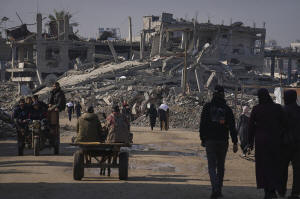Israel and Hamas appear close to a ceasefire deal. These are the
sticking points
 Send a link to a friend
Send a link to a friend
 [December 20, 2024]
By SAMY MAGDY and TIA GOLDENBERG [December 20, 2024]
By SAMY MAGDY and TIA GOLDENBERG
CAIRO (AP) — Israel and Hamas appear closer than they have been in
months to agreeing to a ceasefire that could wind down the 14-month war
in Gaza and bring home dozens of people held hostage there.
But the sides have come close before, only to have talks collapse over
various disagreements. This round of negotiations also faces hurdles.
The agreement would take place in phases and include a halt in fighting,
an exchange of captive Israeli hostages for Palestinian prisoners, and a
surge in aid to the besieged Gaza Strip, according to Egyptian, Hamas
and American officials. The last phase would include the release of any
remaining hostages, an end to the war and talks on reconstruction.
Although Israel and Hamas have expressed optimism that a deal is close,
key sticking points remain over the exchange of hostages for prisoners
and the withdrawal of Israeli troops from Gaza, people involved in the
talks say.
“They are working through the names of hostages who would come out in
the first phase — the names of the prisoners that would be released as
part of the exchange. And then some specific details about the
disposition of Israeli forces during the ceasefire,” White House
National Security Adviser Jake Sullivan said Wednesday on MSNBC's
“Morning Joe."
Here’s a closer look at the key issues holding up a deal:

Hostage release
During its Oct. 7, 2023, attack on southern Israel, Hamas and other
groups took about 250 people hostages and brought them to Gaza. A
previous truce in November 2023 freed more than 100 hostages, while
others have been rescued or their remains have been recovered over the
past year.
Israel says about 100 hostages remain in Gaza — at least a third of whom
it believes were killed during the Oct. 7 attack or died in captivity.
The warring sides are haggling over which hostages would be included in
an initial release, according to the Egyptian and Hamas officials who
spoke on condition of anonymity because they were discussing ongoing
negotiations. There have also been disputes about how many hostages will
be included, Israeli media reported..
The first batch is expected to be made up mostly of women, older people
and people with medical conditions.
Israeli Prime Minister Benjamin Netanyahu also is facing growing
pressure from the families of hostages to secure a deal that would
release all of them at once. They fear the deal could break down or that
loved ones who aren't immediately released could die in captivity.
Palestinian prisoners
As part of the deal, Israel is expected to free hundreds of imprisoned
Palestinians, including dozens who were convicted in bloody attacks.
Israel has a history of lopsided prisoner releases, and hundreds were
freed in the November 2023 deal. But the officials who spoke to the AP
say the sides still disagree over the exact number and names of the
prisoners to be freed. Hamas wants high-profile prisoners included.
[to top of second column]
|

Palestinians carry U.N.-donated flour in Khan Younis, central Gaza
Strip, on Saturday Dec. 14, 2024. (AP Photo/Abdel Kareem Hana, File)

Netanyahu's governing coalition includes hardliners who oppose such
releases, with some even pledging to quit the government if too many
concessions are made. They point to a 2011 prisoner release that
included the former Hamas leader Yahya Sinwar, a mastermind of the
Oct. 7 attacks who was killed by Israel in October.
Israeli media have also reported that there are differences over
whether the more serious prisoners who are released will be exiled
to third countries.
Palestinians returning home
The war has displaced an estimated 90% of Gaza’s 2.3 million people,
according to U.N. estimates, with the hard-hit northern sector of
the territory largely emptied of its prewar population.
During the first phase of the developing deal, Israel is expected to
withdraw troops from Palestinian population centers and allow some
of the displaced to return home. But the extent of the pullback and
the number of people allowed to return must still be worked out, the
officials say.
According to the Egyptian and Hamas officials, Israel is prepared to
allow people to return north to Gaza City, the territory's largest
city. But it does not want people to return farther north to areas
close to the Israeli border.
Israeli troops remain active in these areas, battling what Israel
says are pockets of insurgency. Israel appears concerned that
militants could renew attacks from there if the displaced are
allowed to return.
But critics say Israel has other intentions. Netanyahu has
considered a controversial proposal by former generals to empty the
north and cut it off from humanitarian aid as part of a plan to
starve out any militants who remain there. Moshe Yaalon, a former
Israeli defense minister, said Israel was carrying out ethnic
cleansing in those areas of northern Gaza.
Netanyahu has also said Israel must maintain long-term control over
a strategic strip of land along Gaza's border with Egypt, as well as
the freedom for Israeli troops to operate against militants in the
future. Hamas is demanding a full withdrawal as part of any
ceasefire.

In an interview Thursday, U.S. Secretary of State Antony Blinken
said the U.S. remains hopeful that a deal can be finalized before
President Joe Biden leaves office on Jan. 20.
“Everyone is pushing on this,” Blinken told MSNBC. “We want to get
it over the finish line. We want to get the hostages home. We want
to get a ceasefire so that people can finally have relief in Gaza.”
___
Goldenberg reported from Tel Aviv, Israel. AP correspondents Matthew
Lee and Aamer Madhani contributed reporting from Washington.
All contents © copyright 2024 Associated Press. All rights reserved |